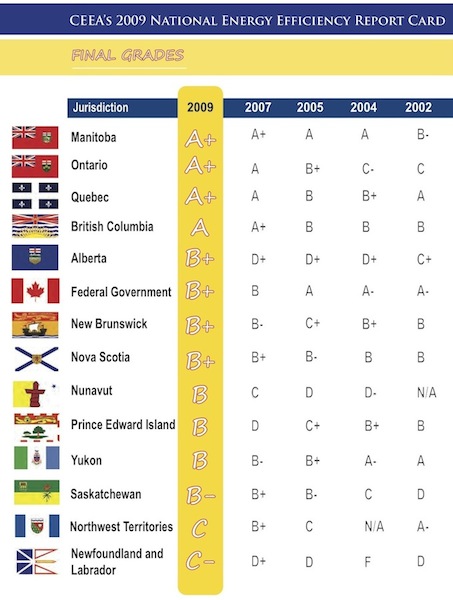
 The Canadian Energy Efficiency Alliance (CEEA) released its 2009 “National Energy Efficiency Report Card”, which evaluates the federal, provincial and territorial governments on their energy efficiency performance every two years. Topping the list are three provinces with A+, while Newfoundland & Labrador flounders at C-.
The Canadian Energy Efficiency Alliance (CEEA) released its 2009 “National Energy Efficiency Report Card”, which evaluates the federal, provincial and territorial governments on their energy efficiency performance every two years. Topping the list are three provinces with A+, while Newfoundland & Labrador flounders at C-.
“We’re very pleased with the progress we’re seeing in energy efficiency
across the country,” said Ken Elsey, president and CEO of CEEA. “This is
the first year that we’ve seen three provinces receive a grade of A+,
and most jurisdictions have either improved or maintained their previous
score.”
Report Card highlights include three A+ grades for Manitoba, Ontario and
Quebec, and three Most Improved jurisdictions: Alberta, Prince Edward
Island and Nunavut. Alberta scored a B+ up from the D+ they received in
2007. PEI moved from a D to a B, and Nunavut from a C to a B.
Some of the provinces that saw a drop in their score included British
Columbia, going from an A+ to an A, Saskatchewan from a B+ to a B-, and
the Northwest Territories moved from a B+ to a C. This year’s scores
reflect activities occurring between January 2008 and December 2009.
“British Columbia should be commended for their exceptional energy
efficiency efforts over the last couple of years, but it’s hard to
maintain an A+, the competition amongst the top provinces is
significant—the bar is being constantly raised,” Elsey commented. “It’s
great to see Alberta jump from a D+ to a B+; that’s a huge improvement,
and something Alberta must be congratulated for. We expect the leader in
energy production to set the example for energy efficiency in the
future! We’ve been hoping for this since the first Report Card was
released 10 years ago.”
The federal government scored a B+ in the Report Card, a mark that Elsey
claims was attributed to the effort put forth by the federal government
through their ecoEnergy program.
“The ecoEnergy program was a tremendously successful program and showed
real leadership, it has helped motivate the provinces and territories.
They have a solid team of professionals on staff ready to do more—we’re
just waiting for the political will to move energy efficiency into the
high priority category,” Elsey said. “With the rising cost of energy and
increased environmental concerns, Canadians expect all levels of
government to take action on energy efficiency—the federal government
has an important role in this. Their support of conservation initiatives
will continue to be essential if Canada is to achieve energy
sustainability in the future.”
This marks the 10th year that CEEA has evaluated federal, provincial and
territorial government’s energy efficiency activities. With energy
becoming more expensive, with its impact on the environment and the
economic opportunity that comes with a sustainable energy plan—it is an
increasingly critical part of the government’s responsibility.
CEEA’s bi-annual Report Card evaluates federal, provincial, and
territorial governments on their energy efficiency performance across a
number of key parameters; how each province has kept promises made at
the Council of the Federation meeting (July 2008), the effectiveness of
their own programs, initiatives in transportation, support for energy
efficiency in building codes and product standards, how the
jurisdictions supported energy efficiency and public outreach, the
existence of public/private partnerships to support energy efficiency
initiatives, and creation of energy efficiency acts, amongst others.
“Since our first Report Card released in 1999, CEEA has seen a great
improvement in energy efficiency measures across the country. We can
only hope that the trend to achieving A+ will continue. As Canada’s
energy consumption continues to rise, and with supply dwindling,
conservation and efficiency are crucial issues for all Canadians,” said
Elsey. “This report shows Canadians how well their elected officials and
senior bureaucrats are dealing with this issue.”
CLICK HERE to download the Report Card, which includes additional commentary.
Print this page